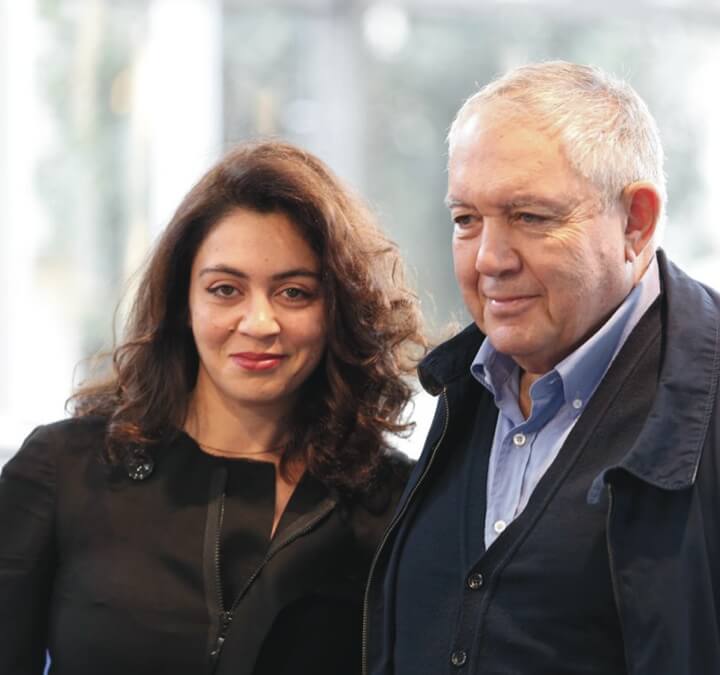Interview with Mia Bassoul and Albert Bassoul
Beirut-based family business Bassoul-Heneine is one of Lebanon’s leading car dealerships. Established in the early 1950s as a joint company between two families, the business flourished by delivering illustrious car brands such as Renault, Alfa Romeo, BMW, MINI, Dacia, and Rolls Royce to the Lebanese market. Today, Bassoul-Heneine employs around 200 people, and is jointly managed by the second and third generation of the family business. Tharawat magazine spoke to Bassoul-Heneine’s Mia Bassoul, Partner, and Albert Bassoul, Chairman, about fathers and daughters, war and peace, and the need to institutionalise the family business.
Father and daughter
“My father and grandfather agreed to my studying literature, provided I came to the office whenever I didn’t have classes,” laughs Mia when we ask her how she came to work for her family’s firm. “And even before that as a child the office was my playground. It has always been part of my life. Sometimes I ask myself what I would have done had I not joined.” At the age of 24 she started to work at Bassoul-Heneine, one of Lebanon’s leading car dealerships, and five years later took on a management position. “I started to focus on how we needed to reorganise internally. We are still very informal and we have to start working on our corporate and family governance.”
[ms-protect-content id=”4069, 4129″]
We ask Mia, third generation family member and partner in the company, how the family business was founded. Instead of simply offering the answer she picks up her office phone and calls her father who is working in the building opposite. “My father really is the one who should be telling you about these things,” says Mia modestly. Complying with his only daughter’s summons, family patriarch and business leader Albert Bassoul appears by Mia’s side with an indulgent smile on his face.
Mia, more comfortable knowing her father will fill in the gaps where needed, now begins to relate the family’s story: “Bassoul and Heneine were two families who joined together in marriage and business at the same time. My grandfather founded the firm 62 years ago in 1951. He married my grandmother who is a Heneine and her brother joined my grandfather in the business. And so Bassoul-Heneine was born and the two families have been represented in the business ever since.” (Picture of Founder Louis Bassoul)
Albert Bassoul remembers that when they started in 1951 with Renault his father landed the brand agency with relative ease. Alfa Romeo, BMW, MINI, Dacia, and Rolls Royce were later added to the family’s portfolio. “The brands have not been included based on the clients’ needs but rather based on the relationships we have with suppliers,” he declares. “These were different times. I remember when my father used to go on business trips and it would take him a full month. Today, people get impatient if you are away from your office for more than three days.”
It is part of Bassoul-Heneine’s modest mentality that they so rarely seem to take into account what an achievement it is to grow a business over three generations with two family trees intertwining and in an industry that has known marked ups and downs over the past few decades.
“Active today are my father, my two cousins, and I,” explains Mia. “We have always had a family member in a management role,” adds Albert. “In the second generation this was natural because we were all boys and I joined first followed by my two cousins who are nearly fifteen years younger than me. In the third generation Mia joined us first and now so too did her cousin Jasmine.”
War and peace
It is impossible to speak to a Lebanese family business without touching on the effects of the country’s protracted civil war and how it shaped the family and the business. Albert Bassoul reflects: “When the civil war began all we did the first few years was work to protect and save what we could. It was like business had frozen and we were holding on as hard as we could to what we had. The irony was that in 1975, just before the war, our sales numbers were so high that Renault actually wanted to set up operations in Lebanon themselves. The unrest and the years of war ended such prospects rendering our partners wholly dependent on our ability to continue operations under even the worst of circumstances.”
Years of war have duly marked the family business and its customers. The Bassoul-Heneine family had to change and shape its strategy by adapting to these new circumstances. “In recent years the regulatory framework has somewhat improved, especially when it comes to the operational side of the automotive business,” explains Mia. Despite all of the wanted and unwanted changes, the main mission of the family business has remained the same throughout the decades. “No matter what we faced, our mission of providing the best service under any circumstances has remained steadfast,” explains Albert Bassoul. “Information goes very fast today. Customers can tell the world very quickly that they are not happy with your product or services. Mia helped me recognise this.”
Today, Bassoul-Heneine has around 200 employees, many of whom have been with the company for decades. “Our view of the future is simple; we want to gain a bigger market share and consolidate.” Yet, as witnessed globally, low cost car brands have increased their market shares. “Generally the market is quite constant and has a small but steady growth over the years. The mentality is changing again. The safety of the buy is more important now than it was before” says Mia.
Formal and informal
The Bassoul-Heneine family business has so far fared well, surviving under rapidly changing circumstances. We ask Mia Bassoul why she feels that now is the right moment to professionalise the business structure. “I think we need to make things more efficient. To decentralise power a little bit,” she smiles at her father who in agreement chimes in. “We need to institutionalise, I can see that too,” he says. Clearly proud of his daughter he emphasises that Mia is the right person to take the family through this process. “It has to be done and it will be good for our business, so we will do it,” she states pragmatically.
“We must have discipline. This is required in every business and especially in a family business,” declares Albert Bassoul. “I can be a little authoritarian,” he confesses with a disarming smile. “But my daughter taught me a lot. Of course, I do have the years of experience that give me an edge in the company. I also like to make decisions fast. I always think it’s better to make a wrong decision rather than not make a decision at all.”
With his daughter’s kind words it is easy to imagine 70-year old Albert Bassoul in his role as head of the family and confidant of his employees. “Dad is their security net; they come to him with their worries,” Mia attests. “That’s why the human aspect of our business will remain in family hands because there is not really a substitute for that. Basically, we want to stay involved but professionalise the management. I hope that it will push the progress of the institutionalisation.” According to Mia and Albert this will change the family’s relationships. “We are used to spending time in each other’s offices and even when we started the regular family meetings it was hard to convince everyone. We were just so used to doing it the informal way. I think our relationship as a family will change when we professionalise though we believe that the complimentary natures of Bassoul and Heneine have gotten us this far and will continue to be the foundation of our success.”
Albert Bassoul shares in his daughter’s vision though they admit that the discussion has not been without disagreement. “Of course, there are different points of view, and opinions diverge at times” he declares. “But there is nothing wrong with that, it is normal. You just have to manage it.”
Tharawat Magazine, Issue 24, 2014
[/ms-protect-content]

